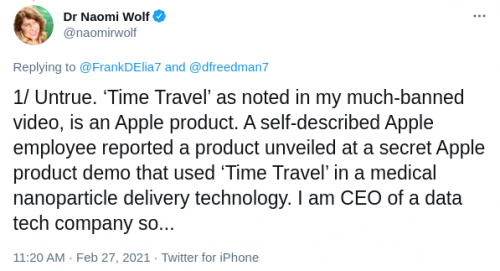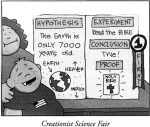Yeah, I get YouTube comments now. Watch this guy go from you admitted that you think
to therefore, Jesus!
in the span of a short paragraph.
PZ Myers , if you go back and listen to the answers you had provided to my questions, in that discord question and answer show which begins at 1:00:15, then you’ll see that you’ve admitted the existence of God1. That’s because you admitted Logic is conceptualized by a mind2. You then admitted that you assume logic exists with regards to governing the natural universe3. Hence, it would then follow that a mind is responsible for actualizing and sustaining that universe4. There’s no way to get around this5. Now that you know the truth, then I urge you to accept Christ Jesus as your Lord and savior6. Repent of your sins. Ask Jesus to come into your heart. And receive eternal life in him7.
- I’m pretty sure I didn’t.
- OK, my brain processes information from the world around me, producing thoughts and actions, if that’s what you mean by “coneptualize”.
- The universe operates on fundamental rules — Newton’s laws of motion, the Boyle Ideal Gas Law, the Nernst equation, etc. This does not imply that Newton, Boyle, and Nernst conjured the rules into existence, but that they perceived them and described them accurately.
- Oops. You’ve leapt from “conceptualizing” to “created”. Those are not synonyms. If I draw a picture of a tree, it does not imply that I created the tree.
- Looks like I just did.
 You haven’t justified the choice of Christ Jesus. What if I prefer Mohammed? I think Anansi is more my kind of savior.
You haven’t justified the choice of Christ Jesus. What if I prefer Mohammed? I think Anansi is more my kind of savior.- Yeah, yeah, yeah. I’ve heard your silly dogma before. How about if you take reason and evidence into your heart, and live a more sensible life?
I’m also thinking of a different chain of “logic”. a) my thoughts are generated by a brain; b) he’s just admitted that god conceptualized the universe; c) therefore god has a brain; d) therefore, if I do find myself at the pearly gates in an afterlife, all I have to do is get past his bodyguards and hit him in the head with a rock very hard, and his reign of terror will be ended, and we can arrange a more equitable distribution of power and glory to all of the souls in Heaven, before liberating all his poor victims trapped in Hell. You can look forward to it — shortly after I die here on Earth, expect the Jubilee, Christians!







